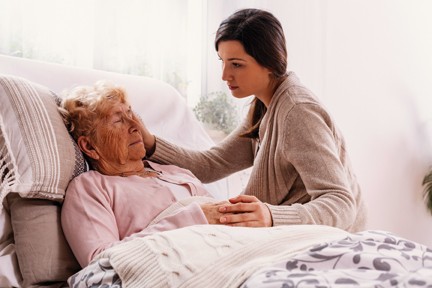
By Gina M. Barry
Bacon Wilson P.C.
Approximately 44 million Americans (21 percent of the adult population) provide unpaid care in their home. In fact, the U.S. Department of Health and Human Services estimates that informal caregivers provide 80 percent of the long-term care in the United States. A caregiver is anyone who helps another person in need with daily tasks, such as bathing, cooking, eating, taking medications, dressing, using the bathroom, shopping, and house cleaning.
Pandemic complications
With COVID-19 severely impacting our nation, family caregivers have found themselves taking on even more responsibilities in the home. Presently, school age children are home and require additional support to remain current in their studies. Hired helpers who would normally visit the home, such as cleaning services, have been ordered to stay home. Friends and family who would provide a few welcomed hours of respite cannot visit to provide this sorely needed support.
A growing threat
Caregiver stress is real, and its impact is severe. Providing care is physically and emotionally demanding, especially when the care recipient requires 24 hour care. A spousal caregiver over the age of 65 has a greatly increased risk of dying over spouses in the same age group who are not providing care. Very often, the caregiving spouse neglects their own health issues, which are usually compounded by stress, because they are too busy addressing the care needs of the spouse.
Telltale signs
Obvious physical signs of stress include, but certainly are not limited to, fatigue, high blood pressure, irregular heart beat or palpitations, chest pain, back, shoulder or neck pain, frequent headaches, digestive problems, and hair loss. Caregivers experiencing sustained stress may also exhibit a weakened immune system. Emotional signs of stress are usually not easily observed. These signs include anxiety, depression, irritability, frustration, lack of control, or isolation. A stressed caregiver may also report or exhibit mood swings, memory problems, and/or general unhappiness, including expressing resentment toward the care recipient and family members who do not contribute.
Asking for help
Most often, caregivers have difficulty asking for help. Either they do not recognize the stress, or they feel hopeless. Caregivers often feel extreme guilt when asking someone else to provide care in their stead, even if only for a short period of time. Thus, it is very important for the family and friends of caregivers to encourage regular respite for the caregiver and to ensure that the caregiver takes these regular breaks. Respite can still be provided in the home even today, and once the pandemic concerns have abated, may take the form of day care or a short stay at a nursing facility.
Take advantage of services
There are many other ways that caregivers can reduce their stress. Caregivers should learn about programs that are available to assist with caregiving and how to qualify for such assistance. There are a variety of programs available, including meal delivery, and home health care, with day care and elective transportation resuming once the COVID-19 infection rate subsides.
An elder law attorney can help determine for which programs the elder would qualify and/or the steps to be taken to ensure eligibility for benefits in the future. Caregivers should also objectively look at the care they are providing and determine whether it may be done more efficiently. For example, it may be preferable to purchase a new washing machine and dryer than to continue to use a public laundromat. Caregivers should also prioritize tasks, use lists, and establish a daily routine, while avoiding taking on additional projects, such as hosting a holiday meal.
Seek out, utilize support
Some caregivers find individual counseling helpful. In addition, there are many different support groups that are great for developing friendships with other caregivers and to learn improved ways to provide care or cope with difficulties. Many of these services have moved online and remain available to those in need.
Moreover, caregivers should be sure to include some fun in their weekly schedule. Socially-distanced activities, such as going for a walk, taking a bath, solving puzzles, family game night, or even spending quality time with a beloved pet, can be delightful distractions. Caregivers should also be sure to get regular exercise, which provides stress relief and has a positive effect on mood. Currently, many exercise facilities are providing exercise classes and training in an online format. In addition, caregivers should plan healthy meals and do their best to adhere to a sleep schedule that ensures they will receive adequate ongoing rest.
Making caregiving work
When a caregiver is cognizant of the signs of caregiver stress and actively works to combat this stress, the caregiver will be better able to provide care and for a much longer period of time. Whenever possible, family and friends should also be sure to support the caregiver and to be on the lookout for any signs of caregiver stress.
With the increased stress of COVID-19 and the anticipated increase in caregiving by family members, if we do not adhere to these practices, our nation’s next disabling pandemic will likely be caregiver stress.
Gina M. Barry is a Partner with the law firm of Bacon Wilson, P.C., Attorneys at Law. She is a member of the National Association of Elder Law Attorneys, the Estate Planning Council, and the Western Massachusetts Elder Care Professionals Association. She concentrates her practice in the areas of estate and asset protection planning, probate administration and litigation, guardianships, conservatorships and residential real estate. Gina may be reached at 413-781-0560 or gbarry@baconwilson.com.